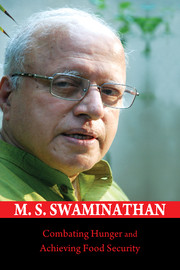Book contents
- Frontmatter
- Contents
- Foreword
- Preface
- Acknowledgements
- Abbreviations
- 1 Genesis and Growth of the Yield Revolution in Wheat
- 2 Our Agricultural Heritage
- 3 Shaping Our Agricultural Destiny
- 4 Thrust on Farm Revival
- 5 Nutri-farm Movement
- 6 Nutrition-sensitive Agriculture
- 7 Food Losses and Food Waste
- 8 Rice in Zero Hunger Challenge
- 9 Monsoon Management
- 10 Importance of Ecological Conservation
- 11 Caring for Ecology and Heritage
- 12 Conserving Biodiversity
- 13 Overcoming Hidden Hunger through Aquaculture
- 14 Biofuels – The Way to Go
- 15 Food Security
- 16 Vigilance for Sustainable Food Security
- 17 Food Security and Social Protection
- 18 Food Security and its Role
- 19 Sustaining the Livestock Revolution
- 20 Challenges in the Year of Science
- 21 Agriculture and Humanism
- 22 Fostering the Science of Science Communication
- 23 Olympic Move for Saving Children
- 24 Youth: The Agents of Change
- 25 Role of Women in Agricultural Production
- 26 Know-how to Do-how
- 27 From Bengal Famine to Right to Food
- 28 Financial Institutions and Fighting Food Inflation
- 29 Public Good Research in Agriculture
- 30 The Future of Indian Agriculture
- Bibliography
14 - Biofuels – The Way to Go
Published online by Cambridge University Press: 18 December 2015
- Frontmatter
- Contents
- Foreword
- Preface
- Acknowledgements
- Abbreviations
- 1 Genesis and Growth of the Yield Revolution in Wheat
- 2 Our Agricultural Heritage
- 3 Shaping Our Agricultural Destiny
- 4 Thrust on Farm Revival
- 5 Nutri-farm Movement
- 6 Nutrition-sensitive Agriculture
- 7 Food Losses and Food Waste
- 8 Rice in Zero Hunger Challenge
- 9 Monsoon Management
- 10 Importance of Ecological Conservation
- 11 Caring for Ecology and Heritage
- 12 Conserving Biodiversity
- 13 Overcoming Hidden Hunger through Aquaculture
- 14 Biofuels – The Way to Go
- 15 Food Security
- 16 Vigilance for Sustainable Food Security
- 17 Food Security and Social Protection
- 18 Food Security and its Role
- 19 Sustaining the Livestock Revolution
- 20 Challenges in the Year of Science
- 21 Agriculture and Humanism
- 22 Fostering the Science of Science Communication
- 23 Olympic Move for Saving Children
- 24 Youth: The Agents of Change
- 25 Role of Women in Agricultural Production
- 26 Know-how to Do-how
- 27 From Bengal Famine to Right to Food
- 28 Financial Institutions and Fighting Food Inflation
- 29 Public Good Research in Agriculture
- 30 The Future of Indian Agriculture
- Bibliography
Summary
In recent years, particularly after the very steep escalation in the cost of fossil fuels in 2008, there is a debate about the potential impact of bio-fuels on food security. How can India develop policies for making efforts in the areas of food and energy security mutually reinforcing and not antagonistic? Food versus fuel is not an option, since we need both.
World bio-fuel production increased from about 20 billion litres/year in 2001 to over 100 billion litres/year in 2011. The steepest rise in bio-fuel production occurred in 2007–08 when a sharp rise in food commodity prices occurred. In the evolution of bio-fuels, the first few efforts were in the field of utilizing crop plants. For example, Brazil started a large programme with sugarcane as the feedstock. Public policies like investment subsidies, mandatory installment of ethanol pumps, and taxation of gasoline led to bio-fuel production reaching 12 billion litres/year within a decade. Similarly in the US, ethanol production grew substantially following the enactment of the Energy Tax Act of 1978. Maize-producing states like Iowa started diverting a high proportion of maize for ethanol production. In the European Union also, public policies stimulated the production of biodiesel. The second generation bio-fuels are largely from agricultural crop residues and biomass utilization. Rice straw and other crop biomass are being increasingly used for ethanol production. Jatrophacurcas became the preferred non-edible oil crop for biodiesel manufacture. The third generation bio-fuels will come from microorganisms and from genetically-engineered bacteria. Thus, bio-fuels are providing important new opportunities for scientific research and for income and employment generation.
The future of biofuels will depend upon the development of new technologies. At present ethanol production is largely from sugar-beet, maize, sugarcane and cassava. Biodiesel production is from rapeseed, soybean, palm and jatropha, while bio-methane production is from anaerobic digestion, mainly in maize. The Government of India announced a National Policy for Biofuels in 2009. Under this policy, the target of 20 per cent for all bio-fuels was set for 2017. Progress in achieving the goals of this policy has been slow largely because there were exaggerated expectations from jatropha.
- Type
- Chapter
- Information
- Combating Hunger and Achieving Food Security , pp. 77 - 80Publisher: Cambridge University PressPrint publication year: 2016



